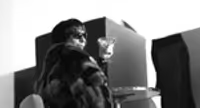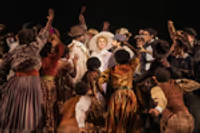Anyone going to the first preview of FOLLIES?
#150Saw it last night and
Posted: 8/15/11 at 12:26amI think someone said she got a new wig for the transfer.
#152Saw it last night and
Posted: 8/15/11 at 12:28amLove the dress. Perfection.
#153Saw it last night and
Posted: 8/15/11 at 12:43amThe wig looks different to me, tighter and more subdued color (at least in the pics) someone did some work.
#154Saw it last night and
Posted: 8/15/11 at 2:23am
'Can someone tell me the director's possible thoughts on the ending. Why did he replay all 4 younger follies about to go out again?'
I've seen this before and have assumed it's always been in the script. btw it's also my very favorite moment in what to me is a generally weak libretto.
#155Saw it last night and
Posted: 8/15/11 at 8:01am
?
Do you mean Young Buddy, Ben Sally and Phyllis? If so, I believe that it was to show the innocence of the ghosts after we saw what became of them, and the other ghost at the end is "trapping" them in the theatre.
#156Saw it last night and
Posted: 8/15/11 at 8:35am
Yeah, I completely disagree re: "Too Many Mornings"; it's one of my favorite absolute favorite moments of the show.
But, you know, it's not a concert, so any awkward transitions from chest to head don't really bother me. I'm more concerned with the acting, and I think her voice--particularly her soprano in this number--is gorgeous. And, well performed.
#157Saw it last night and
Posted: 8/15/11 at 9:37pm
any other pictures of the costumes for the Bway production? Particularly Paige, Houdyshell, and Piel (and Maxwell in Lucy & Jesse).
thx!
#158Saw it last night and
Posted: 8/17/11 at 5:29pm
Is Bolero D'Amour in or out? A friend saw the show last night and said it was not in the show. I thought they had put it in before the first Broadway preview.
Or did I dream that?
#159Saw it last night and
Posted: 8/17/11 at 5:37pmThere were rumors that it was being added back in, but it never was.
#160Saw it last night and
Posted: 8/17/11 at 5:37pmno, PalJoey, there had been a rumor that it was going in but that is not the case. Wish it were in to open the 2nd act......
#161Saw it last night and
Posted: 8/17/11 at 6:06pm
Since there's been so much discussion on "Lucy and Jessie", I was wondering if someone might be able to explain to me their interpretation of the song?
The other three characters' Follies numbers are easier for me to understand how they relate to the characters' phyches and situations, and though I get the gist of "Lucy And Jessie", I'd love to hear someone else's thoughts on the song's deeper meaning for Phyllis.
#162Saw it last night and
Posted: 8/17/11 at 6:27pm
Does anyone here happen to have or know where to find a good hi-res photo of BP in the Loveland sequence, either from D.C. or the current production? I can't seem to find one online.
Phyllis Rogers Stone
Broadway Legend Joined: 9/16/07
#163Saw it last night and
Posted: 8/17/11 at 6:31pm
To whittle it down to the most simplest explanation, it's about the allure as well as the limits of self-reinvention. Throughout the show, Young Phyllis alludes to the lengths she's willing to go to change for Ben, to be the "good wife" that he expects. She DOES go to those lengths and reivents herself as an almost completely different person (she's certainly the one older character of the main four who is least like her younger counterpart) but the result wasn't happiness or completion - it was bitterness and emptiness.
You can think of Young Phyllis as Lucy and Older Phyllis as Jessie. Both women have their strengths and weaknesses but both are dissatisfied with who they are. It's not about turning her back on her youthful self, which is what she's already tried to do. It's about taking the best of both aspects of who she is/was and making one whole (unbroken) person. That's the lesson she wishes she could have learned thirty years ago but she of course couldn't have learned all that without becoming the person she is today.
There's also an undercurrent of acceptance being advocated by the dancers ("Let her [Lucy] know she's better than she suspects" and "Tell her [Jessie] that she's sweller than apple pie"). Ultimately, Phyllis is the strongest of the four, but needs to realize that she couldn't have become who she is without being who she was and that the divide between the two isn't nearly as great as she thinks.
Or something like that.
Updated On: 8/17/11 at 06:31 PM
#164Saw it last night and
Posted: 8/18/11 at 1:13amThank you SO much. Wow, how fascinating. This show, and these characters, really are a marvel.
#165Saw it last night and
Posted: 8/18/11 at 9:23am
A couple of weeks back, someone asked why DIDN'T Ben marry Sally in 1941, since Phyllis needed "work" ("I'm not much now, I know that, but I'll read and I'll study and I'll walk my feet off in the Metropolitan museum", or something like that) and Sally likely was of the same ilk.
This has been nagging at me ever since then; what made Phyllis better wife material? I think Sally was a bit of a puttana (pardon my Italian), good in the sack. The script tells us that Phyllis lost it in a rumble seat, she cried about her mom, etc...it was awkward. Sally really REALLY wanted Ben--I'm a lesbo so I don't have much experience with this, but I've always heard that if you treat a girl like sh*t, they come running, that sort of thing...and usually, the more desperate girls--the ones who really throw themselves at the guy--aren't the ones the men choose, because it's not a challenge. This is the case with Sally, right? Doesn't she have (had?) a line where she says something like "you could have had him but you played it all wrong" and says something about going to bed with him too soon?
Any thoughts on that?
#166Saw it last night and
Posted: 8/18/11 at 10:58pm"Lucy And Jessie" is probably the most obtuse song in the Loveland sequence, and of Phyllis's different numbers. "Uptown, Downtown" covered the same ground but in a more obvious way, and "Ah, But Underneath" takes a different, more sinister tack, being about what Phyllis has lost (and what she's replaced it with) rather than her misguided desire to be two different versions of herself. I can definitely see it going over some heads.
#167Saw it last night and
Posted: 8/18/11 at 11:02pmHer problem with herself is also the least directly addressed out of the four, in my opinion. It isn't until the scene right before the Loveland sequence that we see that's the reason why she's the way she is.
#168Saw it last night and
Posted: 8/18/11 at 11:12pmThat's also true, and I think it's a little bit unfortunate because I find her to be the most interesting of the four main characters and her folly the most worthy of exploration.
#169Saw it last night and
Posted: 8/19/11 at 12:29am
I've never understood what people find so "obtuse" about Lucy/Jessie.
The lyrics could be more clear:
1. Here a sad story about two girls, one young and sweet, one older and cynical.
2. Here the twist: Both of them are me, one when I was younger and one now.
3. If I could only be a little bit like the better parts of each, I would be happy and this song wouldn't be sad.
What is obtuse about that?
Phyllis Rogers Stone
Broadway Legend Joined: 9/16/07
#170Saw it last night and
Posted: 8/19/11 at 12:32amTell 'em that they ought to get together quick, 'cause getting it together is the whoooooole trick!"
#171Saw it last night and
Posted: 8/19/11 at 12:36amRelatively obtuse, anyways. Mostly it's an issue of complex lyrics and a rushing torrent of words and if you're hearing it for the first time it could be easy to get lost keeping track of Lucy vs Jessie (as, admittedly, I did the first time I heard it). It definitely approaches the subject at an angle, anyways, moreso than the other two Phyllis numbers.
bwayfan7000
Broadway Legend Joined: 3/28/09
#172Saw it last night and
Posted: 8/19/11 at 1:22am

As requested, Bernadette in Loveland/"Losing My Mind"
#173Saw it last night and
Posted: 8/19/11 at 1:28amCoincidentally, I actually think "Lucy and Jessie" is my least favorite of the three potential Phyllis numbers.
bwayfan7000
Broadway Legend Joined: 3/28/09
#174Saw it last night and
Posted: 8/19/11 at 1:34amI think "Ah, But Underneath" is better than "Lucy and Jessie" as a song, but "Lucy and Jessie" does have more potential for a phenomenal staging behind it to my mind. But I think the lyrics to "Ah, But Underneath" are the most illuminating to the character of Phyllis. just my opinion, though.
Videos









